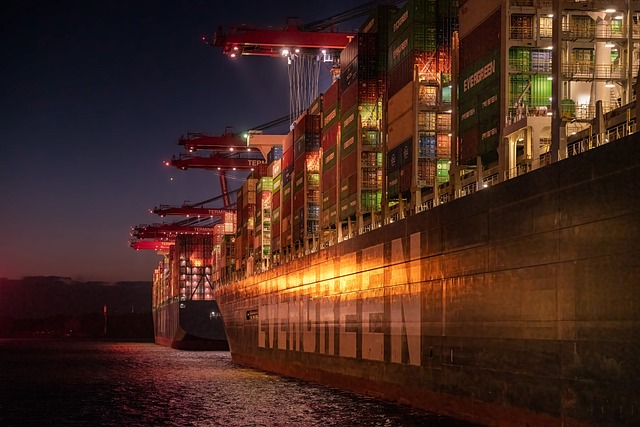The U.S. Trade Representative's (USTR) office has deemed China's dominance in the shipbuilding, maritime, and logistics sectors as "unreasonable" and "actionable" under U.S. trade law. The findings stem from a Section 301 probe initiated in April 2024 by USTR Katherine Tai, following a request from U.S. unions, including the United Steelworkers. While the report does not recommend immediate penalties, it signals the need for swift action under President-elect Donald Trump’s administration.
The USTR report highlights Beijing’s strategic control over these industries, which undermines market-oriented competition, burdens U.S. commerce, and jeopardizes economic security. Tai emphasized the dramatic decline of the U.S. commercial shipbuilding sector, producing fewer than five ships annually compared to China’s 1,700. The findings also spotlight China's reliance on excess steel production, weak labor standards, and centralized control of digital logistics to maintain its dominance.
China’s embassy in Washington refuted the allegations, crediting the country's success to innovation, market competition, and domestic demand. Embassy spokesperson Liu Pengyu dismissed U.S. claims as baseless and economically irrational.
U.S. Senator Mark Kelly echoed the report's urgency, advocating for revitalizing U.S. shipbuilding through targeted legislation to counter China’s influence. United Steelworkers International President David McCall supported the findings, urging decisive action to protect American industries and workers.
The report underscores the need for the U.S. to bolster its supply chains and reclaim competitive ground in maritime industries, as China's dominance continues to challenge global trade dynamics.



 Star Entertainment Secures Debt Refinancing Deal with WhiteHawk Capital to Boost Liquidity
Star Entertainment Secures Debt Refinancing Deal with WhiteHawk Capital to Boost Liquidity  Meta Signs Multi-Billion Dollar AI Chip Deal With Google to Power Next-Gen AI Models
Meta Signs Multi-Billion Dollar AI Chip Deal With Google to Power Next-Gen AI Models  China’s Growth Faces Structural Challenges Amid Doubts Over Data
China’s Growth Faces Structural Challenges Amid Doubts Over Data  Apple Downgraded by Jefferies Amid Weak iPhone Sales and AI Concerns
Apple Downgraded by Jefferies Amid Weak iPhone Sales and AI Concerns  Hyundai Motor Group to Invest $6.26 Billion in AI Data Center, Robotics and Renewable Energy Projects in South Korea
Hyundai Motor Group to Invest $6.26 Billion in AI Data Center, Robotics and Renewable Energy Projects in South Korea  U.S. Stock Futures Rise as Trump Takes Office, Corporate Earnings Awaited
U.S. Stock Futures Rise as Trump Takes Office, Corporate Earnings Awaited  SoftBank Eyes Up to $25B OpenAI Investment Amid AI Boom
SoftBank Eyes Up to $25B OpenAI Investment Amid AI Boom  BlueScope Steel Shares Drop After Rejecting Revised A$15 Billion Takeover Bid
BlueScope Steel Shares Drop After Rejecting Revised A$15 Billion Takeover Bid  Trump Media Weighs Truth Social Spin-Off Amid $6B Fusion Energy Pivot
Trump Media Weighs Truth Social Spin-Off Amid $6B Fusion Energy Pivot  Panama Investigates CK Hutchison’s Port Unit After Court Voids Canal Contracts
Panama Investigates CK Hutchison’s Port Unit After Court Voids Canal Contracts  Snowflake Forecasts Strong Fiscal 2027 Revenue Growth as Enterprise AI Demand Surges
Snowflake Forecasts Strong Fiscal 2027 Revenue Growth as Enterprise AI Demand Surges  Paramount Skydance Forecasts Soft Q1 Revenue as Streaming Growth Counters Linear TV Decline
Paramount Skydance Forecasts Soft Q1 Revenue as Streaming Growth Counters Linear TV Decline  Why the Middle East is being left behind by global climate finance plans
Why the Middle East is being left behind by global climate finance plans  Synopsys Q2 Revenue Forecast Misses Expectations Amid China Export Curbs and AI Shift
Synopsys Q2 Revenue Forecast Misses Expectations Amid China Export Curbs and AI Shift  Gold Prices Rise as Markets Await Trump’s Policy Announcements
Gold Prices Rise as Markets Await Trump’s Policy Announcements  Wall Street Rebounds as Investors Eye Tariff Uncertainty, Jobs Report
Wall Street Rebounds as Investors Eye Tariff Uncertainty, Jobs Report  Coupang Faces Fallout from Data Breach and Rising Competition in South Korea’s E-Commerce Market
Coupang Faces Fallout from Data Breach and Rising Competition in South Korea’s E-Commerce Market 































